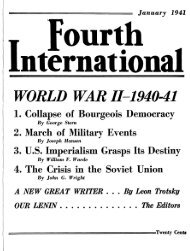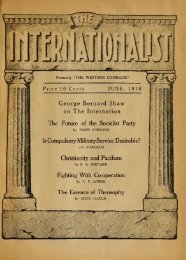National Liberation Movements and the Question of Socialism ...
National Liberation Movements and the Question of Socialism ...
National Liberation Movements and the Question of Socialism ...
You also want an ePaper? Increase the reach of your titles
YUMPU automatically turns print PDFs into web optimized ePapers that Google loves.
view but only part <strong>of</strong> a long process that, ~n <strong>the</strong> e~d,<br />
sees <strong>the</strong> end <strong>of</strong> nations (<strong>and</strong> <strong>the</strong> end <strong>of</strong> rac1sm, s:x1sm,<br />
etc.). Moreover, as has been noted by major Marx1st<br />
<strong>the</strong>oreticians, <strong>the</strong> call for national liberation<br />
by itself is a call <strong>of</strong> <strong>and</strong> by <strong>the</strong> capitalist elements<br />
<strong>and</strong> <strong>the</strong>ir supporters:<br />
Not only <strong>the</strong> dem<strong>and</strong> for <strong>the</strong> self-determination<br />
<strong>of</strong> nations but all <strong>the</strong> items <strong>of</strong><br />
our democratic minimum programme were advanced<br />
before us, as far back as <strong>the</strong> seventeenth<br />
<strong>and</strong> eighteenth centuries, by <strong>the</strong> pettybourgeoisie.<br />
And <strong>the</strong> petty bourgeoisie continues<br />
to this day to advance ~<strong>the</strong>se<br />
dem<strong>and</strong>s in a utopian way, without seeing <strong>the</strong><br />
class struggle <strong>and</strong> <strong>the</strong> fact that it has become<br />
intensified under democracy, <strong>and</strong> believing<br />
in "peaceful" capital ism.<br />
(Lenin, "The Socialist Revolution" ... , p. 271.)<br />
As one example <strong>of</strong> Lenin's position, <strong>the</strong> great<br />
Irish* writer, Jonathan Swift, spent his life promoting<br />
<strong>the</strong> interests <strong>of</strong> national liberation for Irel<strong>and</strong> <strong>and</strong>,<br />
in particular, independence for <strong>the</strong> Irish ~eas~ntry<br />
<strong>and</strong> o<strong>the</strong>r petty producers from English dom1nat1on ..<br />
(See, Rubinstein, The Great Tradition~ English Llterature,<br />
Vol. 1, p~224-251 .) His most famous (<strong>and</strong>,<br />
from <strong>the</strong> British point <strong>of</strong> view, notorious) works,<br />
Gulliver's Travels <strong>and</strong> A Modest Proposal, are nothing<br />
more than political tracts designed to propag<strong>and</strong>iz~<br />
<strong>and</strong> popularize <strong>the</strong> aspira!ion~ <strong>and</strong> in!erests .<strong>of</strong>, Ir1~h<br />
capitalists <strong>and</strong> proto-cap1tal1sts. G1ven Sw1ft.s t1me,<br />
however, this can only be seen as most progress1ve <strong>and</strong><br />
advanced.<br />
Jumping to <strong>the</strong> modern period, one can observe<br />
that national liberation movements still serve <strong>the</strong> same<br />
class's interests. Consider, for example, <strong>the</strong> case <strong>of</strong><br />
*Though born <strong>of</strong> English parents •. Swift l~ved.in <strong>and</strong><br />
was a citizen <strong>of</strong> Irel<strong>and</strong> <strong>and</strong> ded1cated h1s l1fe to<br />
<strong>the</strong> cause <strong>of</strong> Irish nationalism. For this reason, he<br />
can be viewed as Irish in his orientation.<br />
<strong>the</strong> very strong Indian nationalist movement <strong>of</strong> <strong>the</strong><br />
1930's <strong>and</strong> 1940's. Nehru, one <strong>of</strong> <strong>the</strong> chief leaders <strong>of</strong><br />
this movement, makes <strong>the</strong> essential point very clearly:<br />
"[<strong>the</strong> Indian national movement] has not been<br />
[for] a change <strong>of</strong> <strong>the</strong> social order, but<br />
political independence ... It is absurd to say<br />
that <strong>the</strong> leaders betray <strong>the</strong> masses because<br />
<strong>the</strong>y do not try to upset <strong>the</strong> l<strong>and</strong> system or<br />
<strong>the</strong> capitalist system. They never claimed<br />
to do so."<br />
(J. Nehru, Autobiography, pp. 366-7.)<br />
With this perspective in mind, <strong>the</strong> Indian <strong>National</strong><br />
Congress Party set forward an ideological program designed<br />
to enlist <strong>the</strong> support <strong>of</strong> <strong>the</strong> majority <strong>of</strong> <strong>the</strong><br />
population <strong>and</strong>, <strong>the</strong>n--as one would expect--consistently<br />
stabbed <strong>the</strong> workers <strong>and</strong> peasants in <strong>the</strong> back, betraying<br />
<strong>the</strong>m on every occasion in which <strong>the</strong>y had <strong>the</strong> opportunity.<br />
And, <strong>of</strong> course, <strong>the</strong>y promoted G<strong>and</strong>hi, one <strong>of</strong> <strong>the</strong><br />
current darlings <strong>of</strong> <strong>the</strong> 1 i beral (capitalist) camp,<br />
as <strong>the</strong> great leader: G<strong>and</strong>hi was in <strong>the</strong> pay <strong>of</strong> <strong>the</strong><br />
single largest Indian capitalist <strong>and</strong> always at <strong>the</strong><br />
service <strong>of</strong> <strong>the</strong> Empire--as long as <strong>the</strong> Empire would<br />
make some concessions to <strong>the</strong> Indian business class.<br />
What <strong>the</strong> Nehrus <strong>and</strong> <strong>the</strong> G<strong>and</strong>his accomplished was <strong>the</strong><br />
defeat <strong>of</strong> <strong>the</strong> Indian lower classes, <strong>the</strong> sabotage <strong>of</strong><br />
a revolutionary national liberation movement <strong>and</strong> <strong>the</strong><br />
preservation <strong>of</strong> India for <strong>the</strong> continued rule <strong>of</strong> imperialism.<br />
Every child now starving in Delhi <strong>and</strong> elsewhere<br />
should be laid at <strong>the</strong> graves <strong>of</strong> <strong>the</strong>se immortal<br />
"heroes" <strong>and</strong> <strong>the</strong> class <strong>the</strong>y represented.<br />
The Marxist Position on <strong>National</strong><br />
<strong>Liberation</strong> <strong>Movements</strong><br />
Marxists have always stood for national independence<br />
<strong>and</strong> have supported national liberation movements<br />
even though it is realized that <strong>the</strong>se movements have<br />
severe limitations <strong>and</strong> small chance <strong>of</strong> success. The<br />
Marxist position clearly recognizes that <strong>the</strong>se move-<br />
8<br />
9
















